Empowering Users in Health and Social Care
VerifiedAdded on 2023/01/13
|17
|4322
|27
AI Summary
This document discusses the importance of empowering users in health and social care, factors contributing to non-participation and loss of independence, managing organization processes to promote participation and independence, tensions between individual rights and service provider duty, and the effectiveness of policies and procedures in promoting risk management. The case study of Denise is used to illustrate the extent to which individuals are at risk of harm in health and social care settings.
Contribute Materials
Your contribution can guide someone’s learning journey. Share your
documents today.
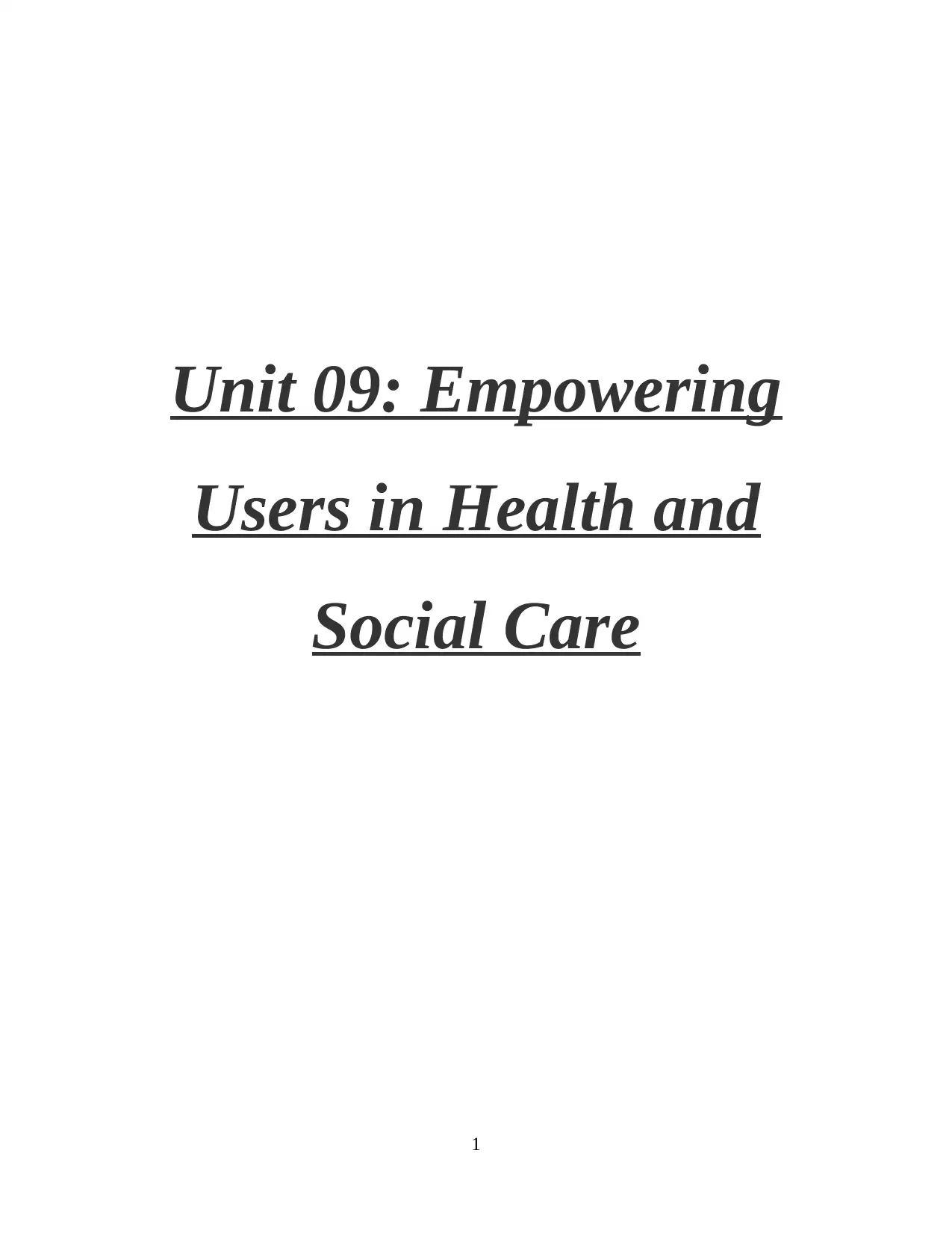
Unit 09: Empowering
Users in Health and
Social Care
1
Users in Health and
Social Care
1
Secure Best Marks with AI Grader
Need help grading? Try our AI Grader for instant feedback on your assignments.
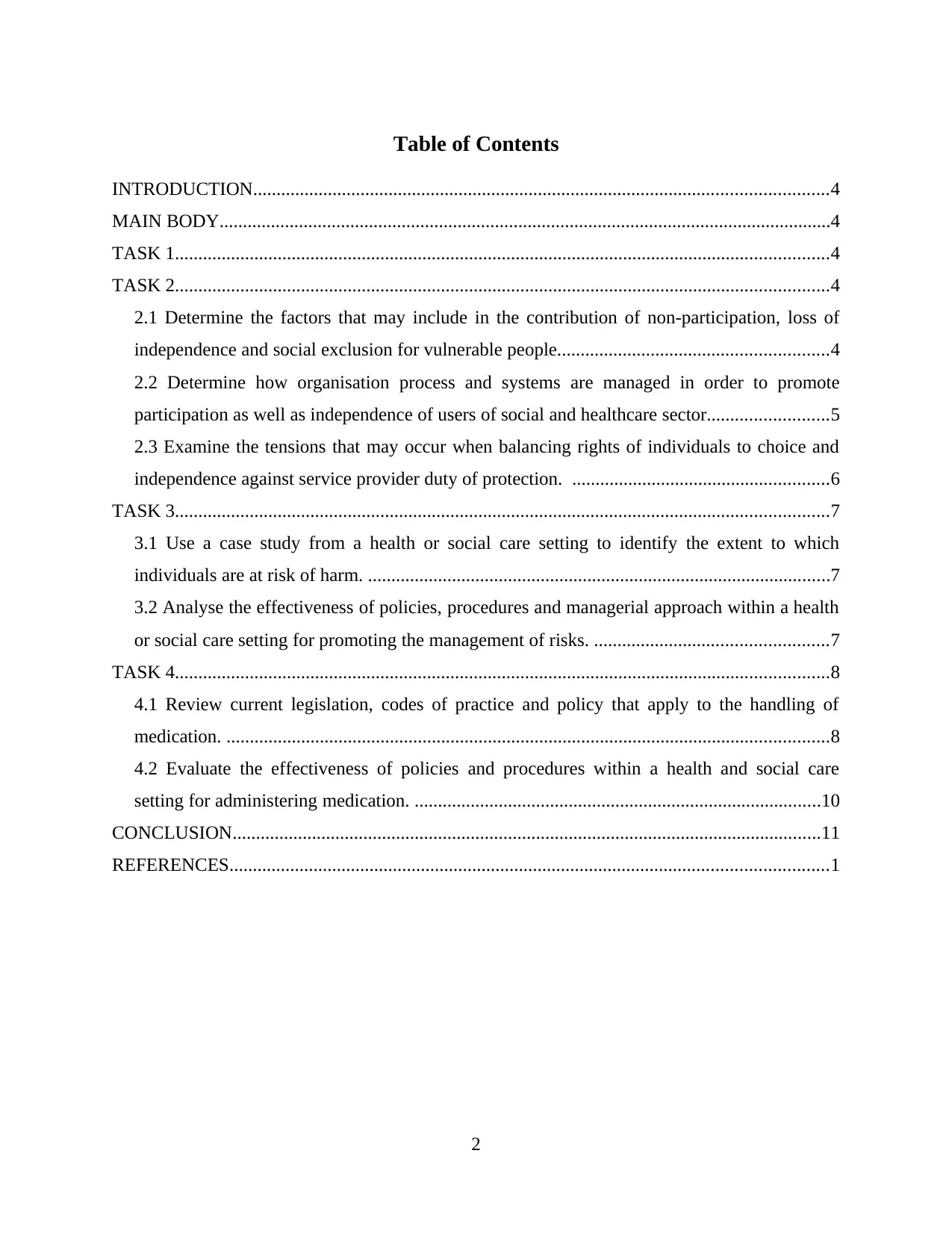
Table of Contents
INTRODUCTION...........................................................................................................................4
MAIN BODY...................................................................................................................................4
TASK 1............................................................................................................................................4
TASK 2............................................................................................................................................4
2.1 Determine the factors that may include in the contribution of non-participation, loss of
independence and social exclusion for vulnerable people..........................................................4
2.2 Determine how organisation process and systems are managed in order to promote
participation as well as independence of users of social and healthcare sector..........................5
2.3 Examine the tensions that may occur when balancing rights of individuals to choice and
independence against service provider duty of protection. .......................................................6
TASK 3............................................................................................................................................7
3.1 Use a case study from a health or social care setting to identify the extent to which
individuals are at risk of harm. ...................................................................................................7
3.2 Analyse the effectiveness of policies, procedures and managerial approach within a health
or social care setting for promoting the management of risks. ..................................................7
TASK 4............................................................................................................................................8
4.1 Review current legislation, codes of practice and policy that apply to the handling of
medication. .................................................................................................................................8
4.2 Evaluate the effectiveness of policies and procedures within a health and social care
setting for administering medication. .......................................................................................10
CONCLUSION..............................................................................................................................11
REFERENCES................................................................................................................................1
2
INTRODUCTION...........................................................................................................................4
MAIN BODY...................................................................................................................................4
TASK 1............................................................................................................................................4
TASK 2............................................................................................................................................4
2.1 Determine the factors that may include in the contribution of non-participation, loss of
independence and social exclusion for vulnerable people..........................................................4
2.2 Determine how organisation process and systems are managed in order to promote
participation as well as independence of users of social and healthcare sector..........................5
2.3 Examine the tensions that may occur when balancing rights of individuals to choice and
independence against service provider duty of protection. .......................................................6
TASK 3............................................................................................................................................7
3.1 Use a case study from a health or social care setting to identify the extent to which
individuals are at risk of harm. ...................................................................................................7
3.2 Analyse the effectiveness of policies, procedures and managerial approach within a health
or social care setting for promoting the management of risks. ..................................................7
TASK 4............................................................................................................................................8
4.1 Review current legislation, codes of practice and policy that apply to the handling of
medication. .................................................................................................................................8
4.2 Evaluate the effectiveness of policies and procedures within a health and social care
setting for administering medication. .......................................................................................10
CONCLUSION..............................................................................................................................11
REFERENCES................................................................................................................................1
2
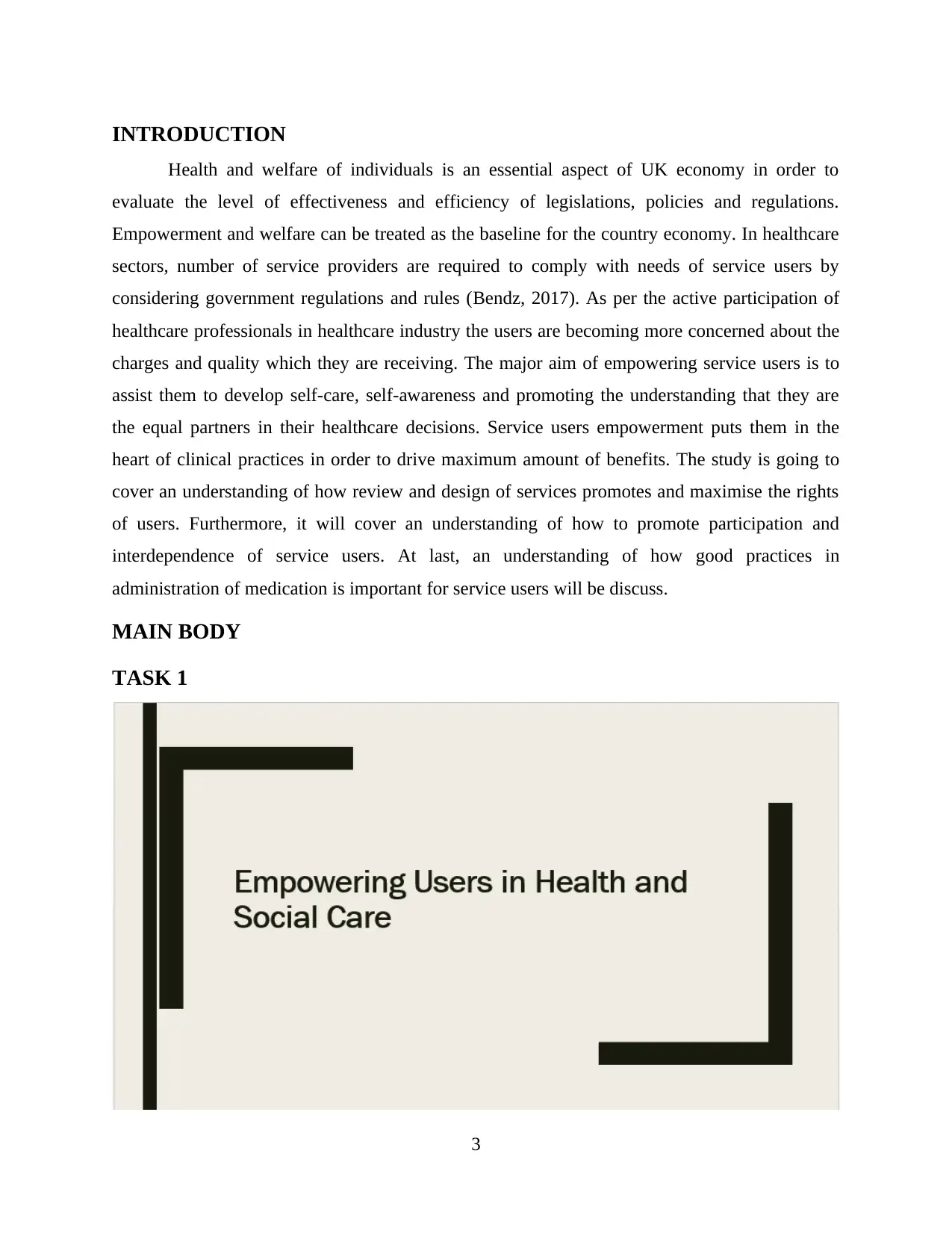
INTRODUCTION
Health and welfare of individuals is an essential aspect of UK economy in order to
evaluate the level of effectiveness and efficiency of legislations, policies and regulations.
Empowerment and welfare can be treated as the baseline for the country economy. In healthcare
sectors, number of service providers are required to comply with needs of service users by
considering government regulations and rules (Bendz, 2017). As per the active participation of
healthcare professionals in healthcare industry the users are becoming more concerned about the
charges and quality which they are receiving. The major aim of empowering service users is to
assist them to develop self-care, self-awareness and promoting the understanding that they are
the equal partners in their healthcare decisions. Service users empowerment puts them in the
heart of clinical practices in order to drive maximum amount of benefits. The study is going to
cover an understanding of how review and design of services promotes and maximise the rights
of users. Furthermore, it will cover an understanding of how to promote participation and
interdependence of service users. At last, an understanding of how good practices in
administration of medication is important for service users will be discuss.
MAIN BODY
TASK 1
3
Health and welfare of individuals is an essential aspect of UK economy in order to
evaluate the level of effectiveness and efficiency of legislations, policies and regulations.
Empowerment and welfare can be treated as the baseline for the country economy. In healthcare
sectors, number of service providers are required to comply with needs of service users by
considering government regulations and rules (Bendz, 2017). As per the active participation of
healthcare professionals in healthcare industry the users are becoming more concerned about the
charges and quality which they are receiving. The major aim of empowering service users is to
assist them to develop self-care, self-awareness and promoting the understanding that they are
the equal partners in their healthcare decisions. Service users empowerment puts them in the
heart of clinical practices in order to drive maximum amount of benefits. The study is going to
cover an understanding of how review and design of services promotes and maximise the rights
of users. Furthermore, it will cover an understanding of how to promote participation and
interdependence of service users. At last, an understanding of how good practices in
administration of medication is important for service users will be discuss.
MAIN BODY
TASK 1
3
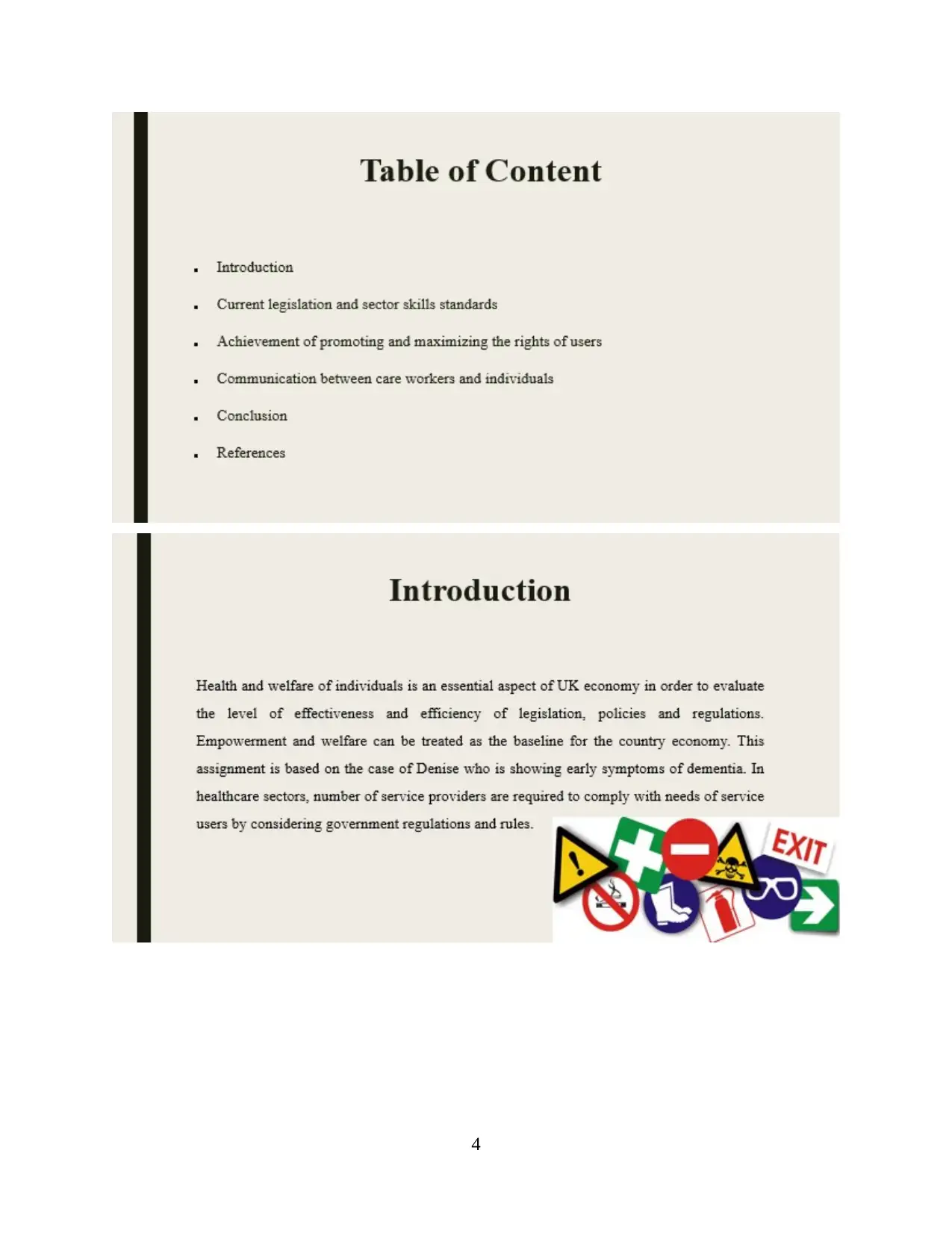
4
Secure Best Marks with AI Grader
Need help grading? Try our AI Grader for instant feedback on your assignments.
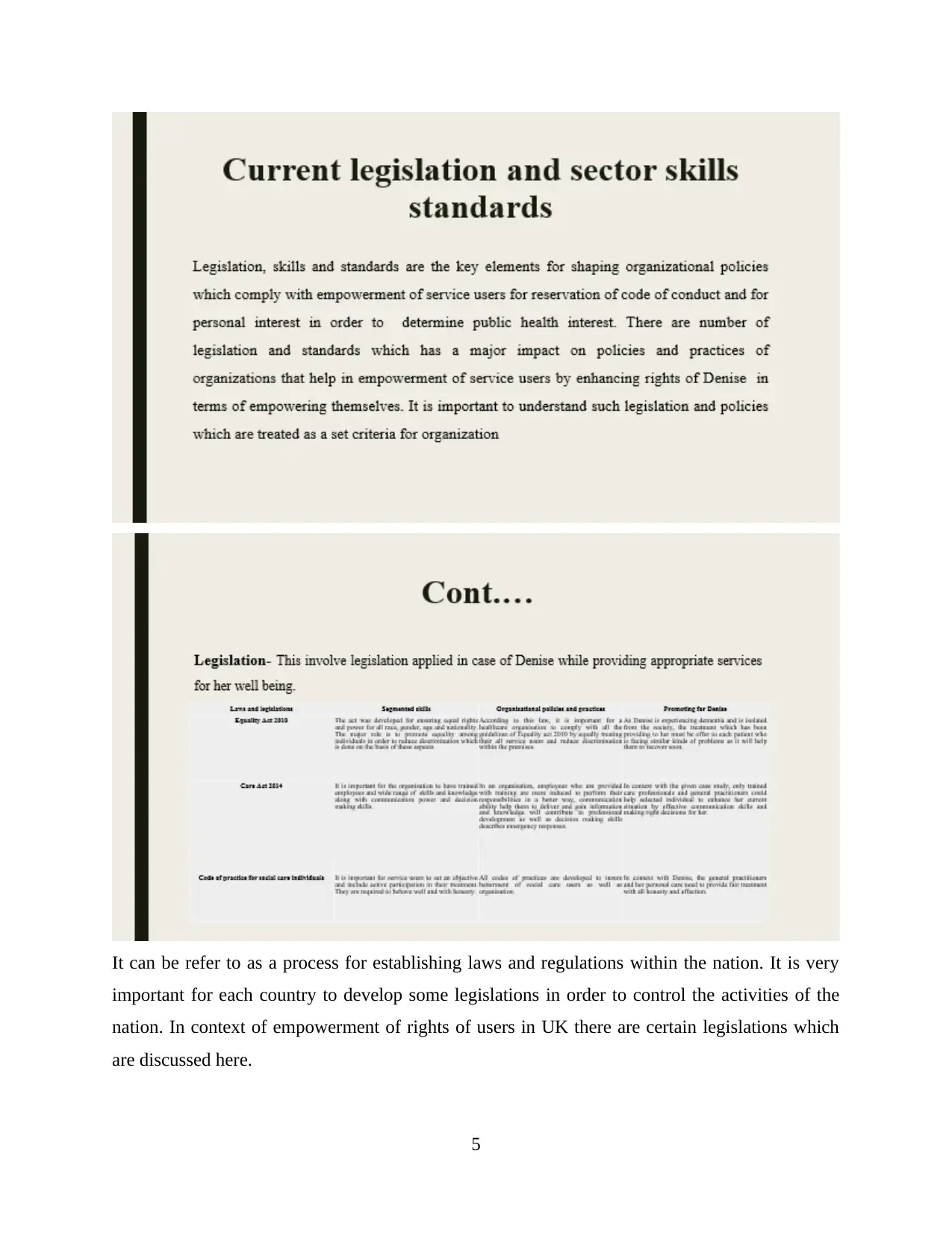
It can be refer to as a process for establishing laws and regulations within the nation. It is very
important for each country to develop some legislations in order to control the activities of the
nation. In context of empowerment of rights of users in UK there are certain legislations which
are discussed here.
5
important for each country to develop some legislations in order to control the activities of the
nation. In context of empowerment of rights of users in UK there are certain legislations which
are discussed here.
5
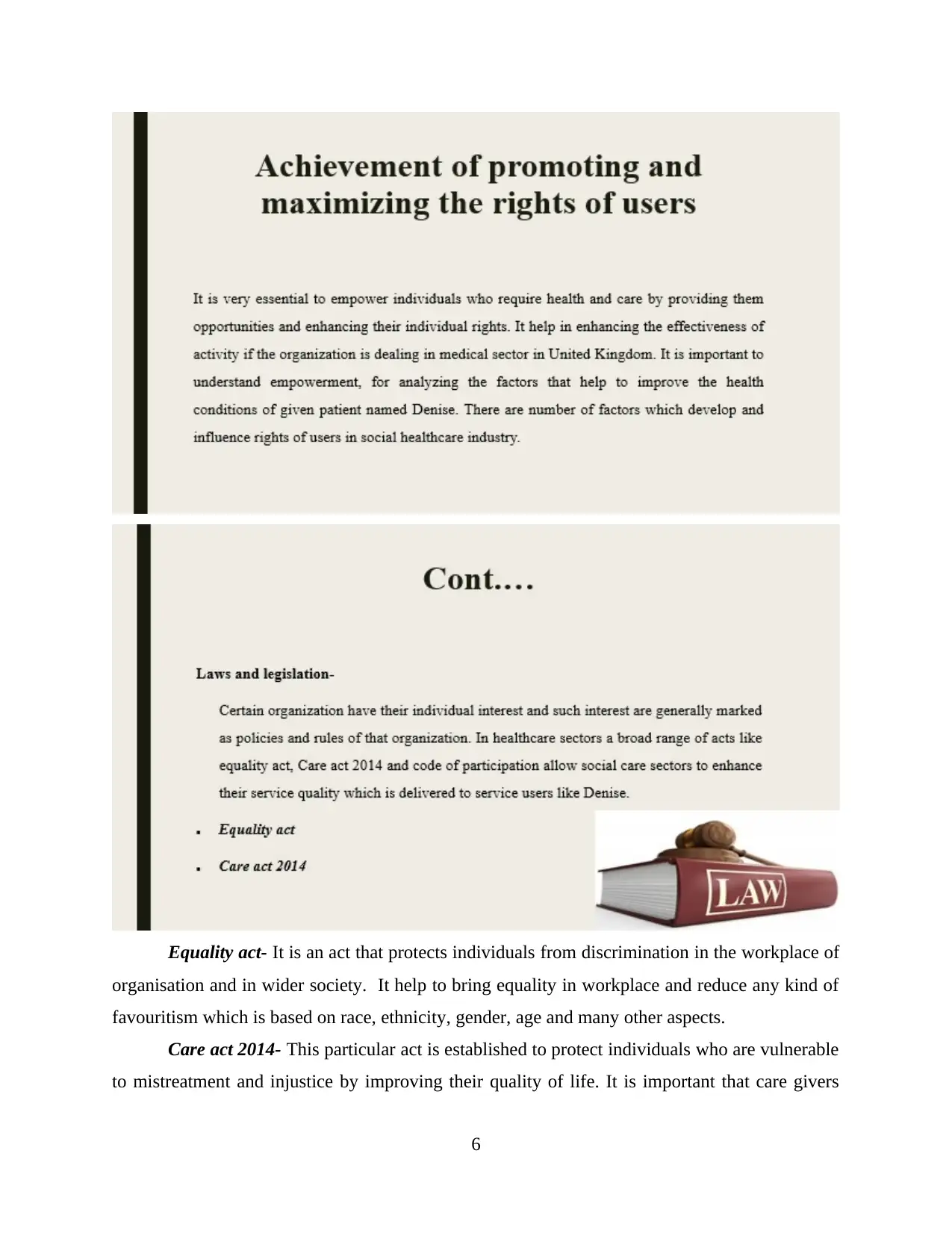
Equality act- It is an act that protects individuals from discrimination in the workplace of
organisation and in wider society. It help to bring equality in workplace and reduce any kind of
favouritism which is based on race, ethnicity, gender, age and many other aspects.
Care act 2014- This particular act is established to protect individuals who are vulnerable
to mistreatment and injustice by improving their quality of life. It is important that care givers
6
organisation and in wider society. It help to bring equality in workplace and reduce any kind of
favouritism which is based on race, ethnicity, gender, age and many other aspects.
Care act 2014- This particular act is established to protect individuals who are vulnerable
to mistreatment and injustice by improving their quality of life. It is important that care givers
6
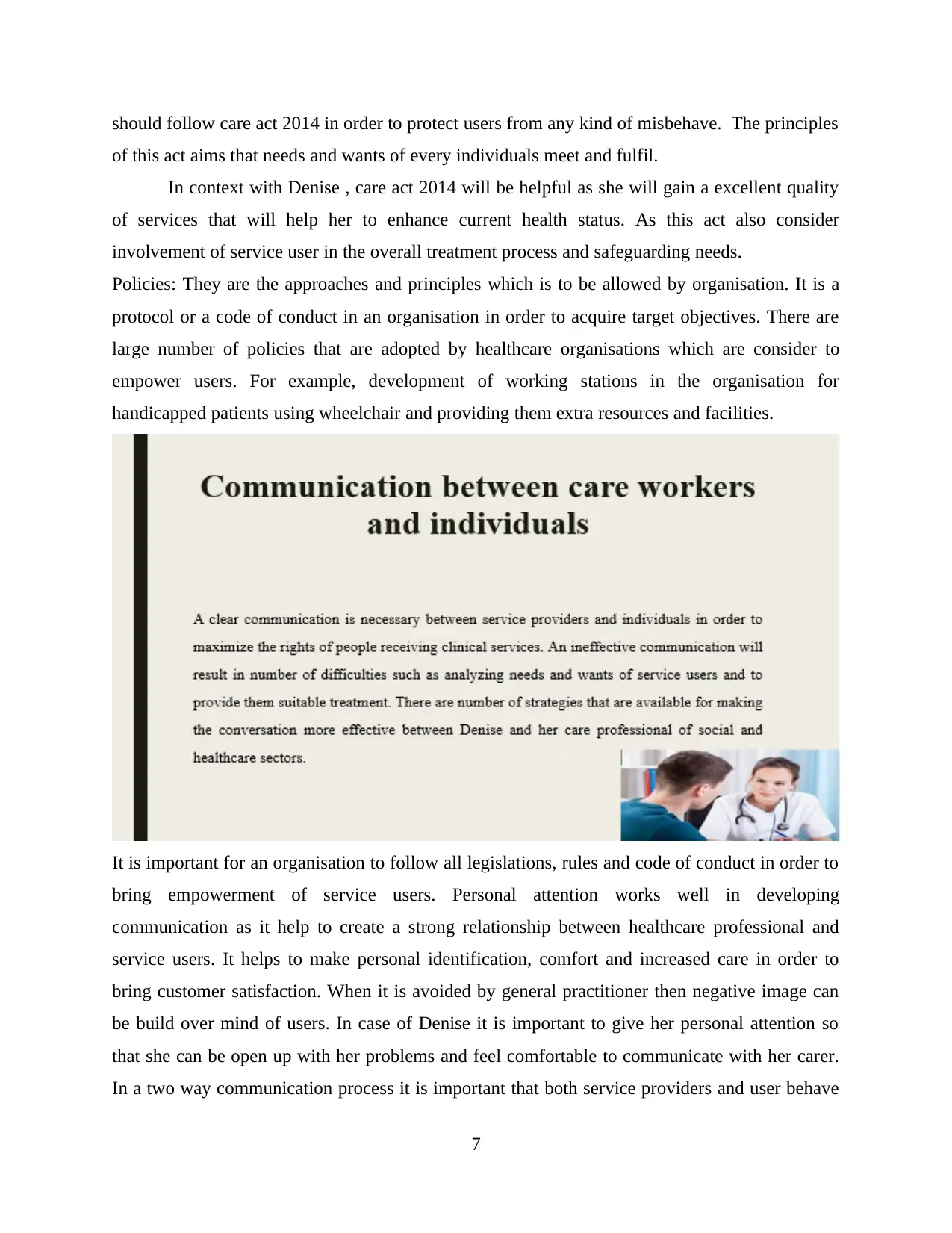
should follow care act 2014 in order to protect users from any kind of misbehave. The principles
of this act aims that needs and wants of every individuals meet and fulfil.
In context with Denise , care act 2014 will be helpful as she will gain a excellent quality
of services that will help her to enhance current health status. As this act also consider
involvement of service user in the overall treatment process and safeguarding needs.
Policies: They are the approaches and principles which is to be allowed by organisation. It is a
protocol or a code of conduct in an organisation in order to acquire target objectives. There are
large number of policies that are adopted by healthcare organisations which are consider to
empower users. For example, development of working stations in the organisation for
handicapped patients using wheelchair and providing them extra resources and facilities.
It is important for an organisation to follow all legislations, rules and code of conduct in order to
bring empowerment of service users. Personal attention works well in developing
communication as it help to create a strong relationship between healthcare professional and
service users. It helps to make personal identification, comfort and increased care in order to
bring customer satisfaction. When it is avoided by general practitioner then negative image can
be build over mind of users. In case of Denise it is important to give her personal attention so
that she can be open up with her problems and feel comfortable to communicate with her carer.
In a two way communication process it is important that both service providers and user behave
7
of this act aims that needs and wants of every individuals meet and fulfil.
In context with Denise , care act 2014 will be helpful as she will gain a excellent quality
of services that will help her to enhance current health status. As this act also consider
involvement of service user in the overall treatment process and safeguarding needs.
Policies: They are the approaches and principles which is to be allowed by organisation. It is a
protocol or a code of conduct in an organisation in order to acquire target objectives. There are
large number of policies that are adopted by healthcare organisations which are consider to
empower users. For example, development of working stations in the organisation for
handicapped patients using wheelchair and providing them extra resources and facilities.
It is important for an organisation to follow all legislations, rules and code of conduct in order to
bring empowerment of service users. Personal attention works well in developing
communication as it help to create a strong relationship between healthcare professional and
service users. It helps to make personal identification, comfort and increased care in order to
bring customer satisfaction. When it is avoided by general practitioner then negative image can
be build over mind of users. In case of Denise it is important to give her personal attention so
that she can be open up with her problems and feel comfortable to communicate with her carer.
In a two way communication process it is important that both service providers and user behave
7
Paraphrase This Document
Need a fresh take? Get an instant paraphrase of this document with our AI Paraphraser
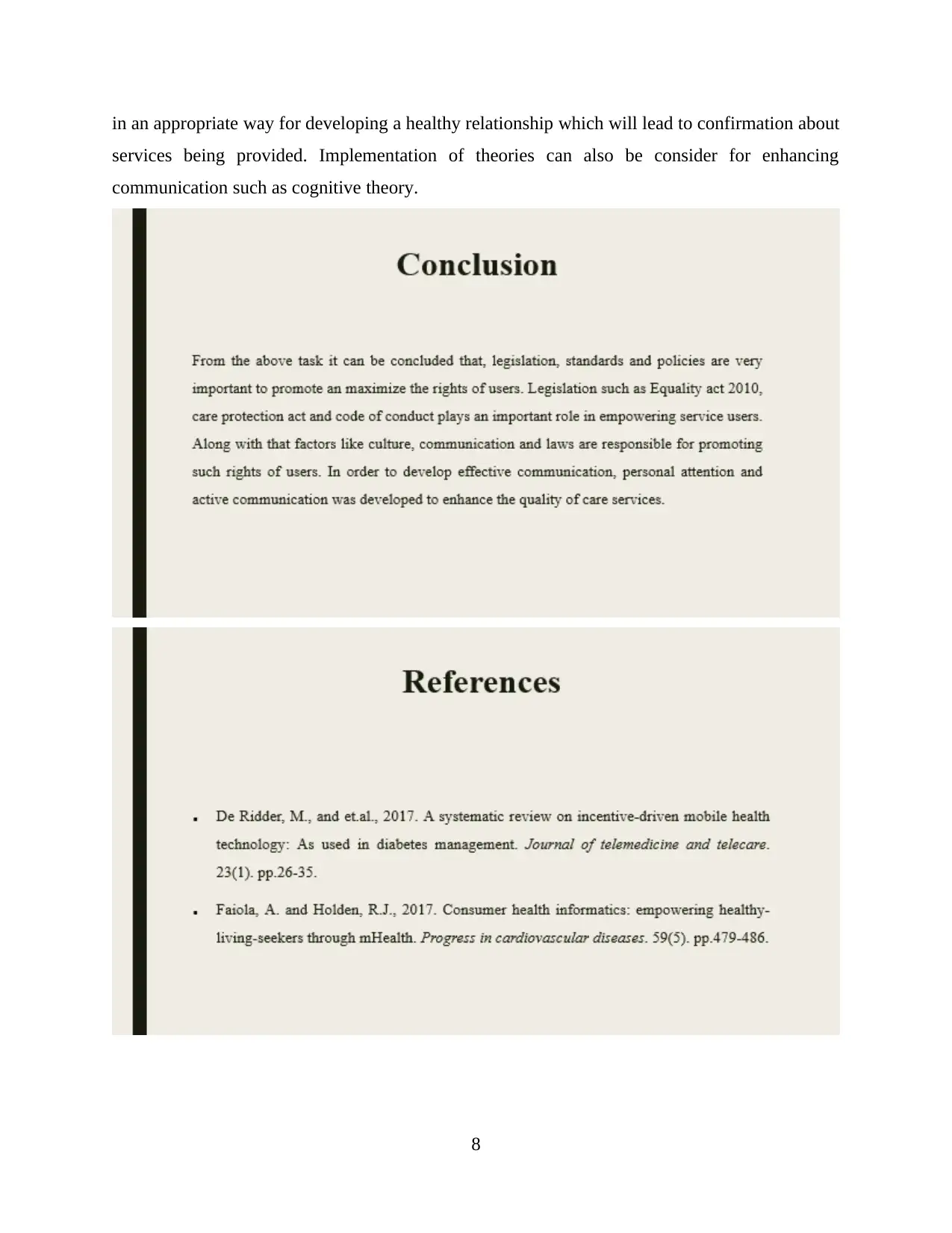
in an appropriate way for developing a healthy relationship which will lead to confirmation about
services being provided. Implementation of theories can also be consider for enhancing
communication such as cognitive theory.
8
services being provided. Implementation of theories can also be consider for enhancing
communication such as cognitive theory.
8
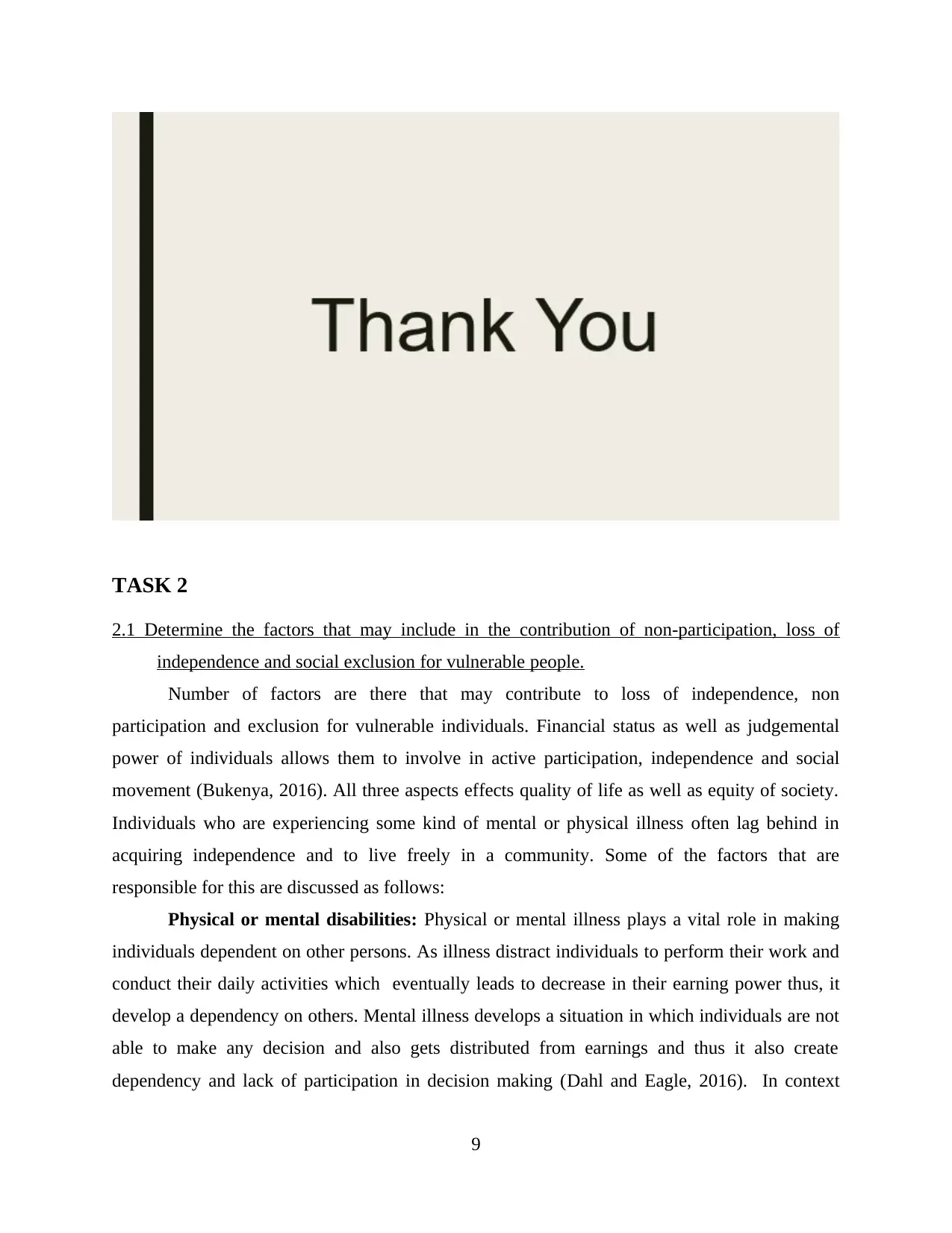
TASK 2
2.1 Determine the factors that may include in the contribution of non-participation, loss of
independence and social exclusion for vulnerable people.
Number of factors are there that may contribute to loss of independence, non
participation and exclusion for vulnerable individuals. Financial status as well as judgemental
power of individuals allows them to involve in active participation, independence and social
movement (Bukenya, 2016). All three aspects effects quality of life as well as equity of society.
Individuals who are experiencing some kind of mental or physical illness often lag behind in
acquiring independence and to live freely in a community. Some of the factors that are
responsible for this are discussed as follows:
Physical or mental disabilities: Physical or mental illness plays a vital role in making
individuals dependent on other persons. As illness distract individuals to perform their work and
conduct their daily activities which eventually leads to decrease in their earning power thus, it
develop a dependency on others. Mental illness develops a situation in which individuals are not
able to make any decision and also gets distributed from earnings and thus it also create
dependency and lack of participation in decision making (Dahl and Eagle, 2016). In context
9
2.1 Determine the factors that may include in the contribution of non-participation, loss of
independence and social exclusion for vulnerable people.
Number of factors are there that may contribute to loss of independence, non
participation and exclusion for vulnerable individuals. Financial status as well as judgemental
power of individuals allows them to involve in active participation, independence and social
movement (Bukenya, 2016). All three aspects effects quality of life as well as equity of society.
Individuals who are experiencing some kind of mental or physical illness often lag behind in
acquiring independence and to live freely in a community. Some of the factors that are
responsible for this are discussed as follows:
Physical or mental disabilities: Physical or mental illness plays a vital role in making
individuals dependent on other persons. As illness distract individuals to perform their work and
conduct their daily activities which eventually leads to decrease in their earning power thus, it
develop a dependency on others. Mental illness develops a situation in which individuals are not
able to make any decision and also gets distributed from earnings and thus it also create
dependency and lack of participation in decision making (Dahl and Eagle, 2016). In context
9
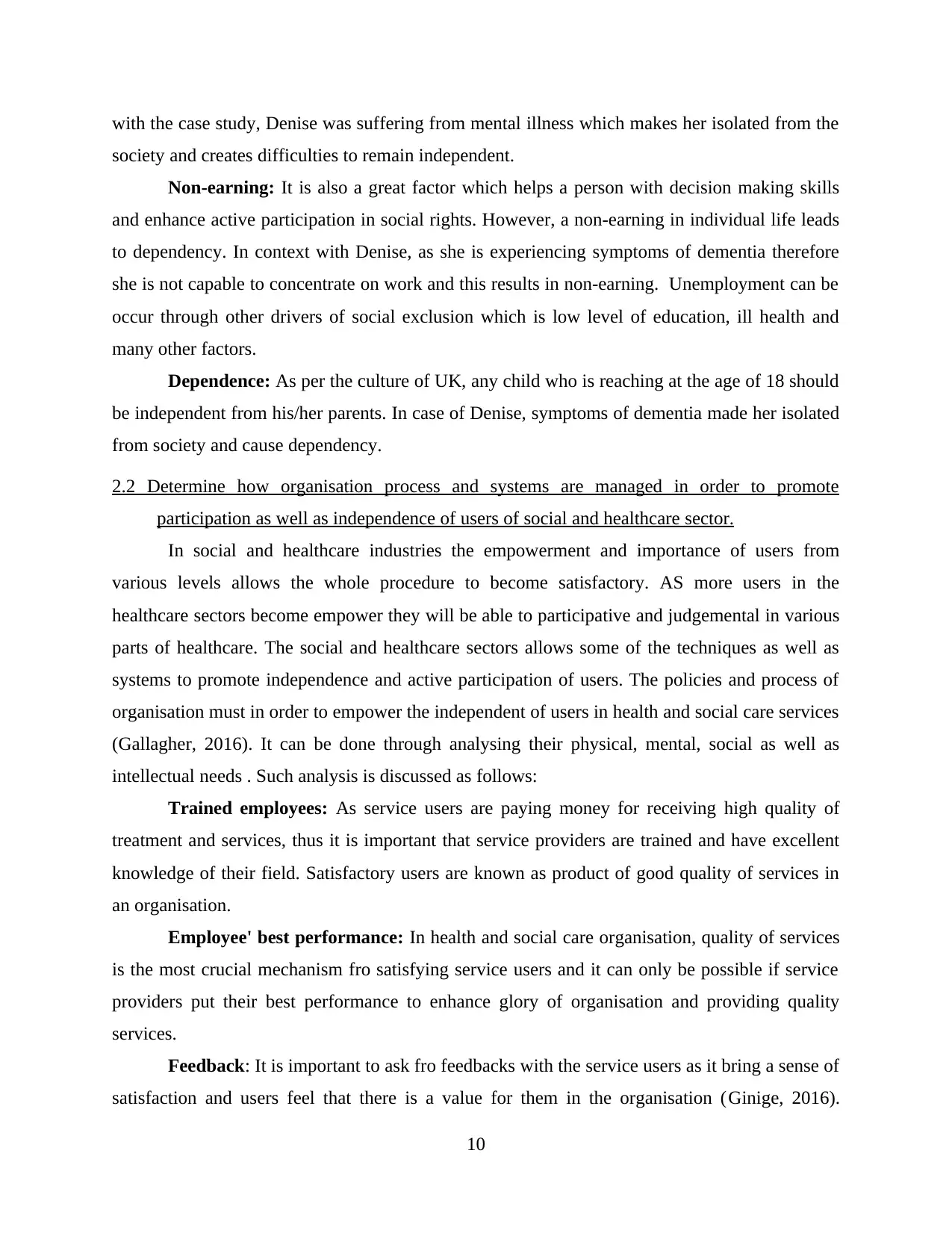
with the case study, Denise was suffering from mental illness which makes her isolated from the
society and creates difficulties to remain independent.
Non-earning: It is also a great factor which helps a person with decision making skills
and enhance active participation in social rights. However, a non-earning in individual life leads
to dependency. In context with Denise, as she is experiencing symptoms of dementia therefore
she is not capable to concentrate on work and this results in non-earning. Unemployment can be
occur through other drivers of social exclusion which is low level of education, ill health and
many other factors.
Dependence: As per the culture of UK, any child who is reaching at the age of 18 should
be independent from his/her parents. In case of Denise, symptoms of dementia made her isolated
from society and cause dependency.
2.2 Determine how organisation process and systems are managed in order to promote
participation as well as independence of users of social and healthcare sector.
In social and healthcare industries the empowerment and importance of users from
various levels allows the whole procedure to become satisfactory. AS more users in the
healthcare sectors become empower they will be able to participative and judgemental in various
parts of healthcare. The social and healthcare sectors allows some of the techniques as well as
systems to promote independence and active participation of users. The policies and process of
organisation must in order to empower the independent of users in health and social care services
(Gallagher, 2016). It can be done through analysing their physical, mental, social as well as
intellectual needs . Such analysis is discussed as follows:
Trained employees: As service users are paying money for receiving high quality of
treatment and services, thus it is important that service providers are trained and have excellent
knowledge of their field. Satisfactory users are known as product of good quality of services in
an organisation.
Employee' best performance: In health and social care organisation, quality of services
is the most crucial mechanism fro satisfying service users and it can only be possible if service
providers put their best performance to enhance glory of organisation and providing quality
services.
Feedback: It is important to ask fro feedbacks with the service users as it bring a sense of
satisfaction and users feel that there is a value for them in the organisation (Ginige, 2016).
10
society and creates difficulties to remain independent.
Non-earning: It is also a great factor which helps a person with decision making skills
and enhance active participation in social rights. However, a non-earning in individual life leads
to dependency. In context with Denise, as she is experiencing symptoms of dementia therefore
she is not capable to concentrate on work and this results in non-earning. Unemployment can be
occur through other drivers of social exclusion which is low level of education, ill health and
many other factors.
Dependence: As per the culture of UK, any child who is reaching at the age of 18 should
be independent from his/her parents. In case of Denise, symptoms of dementia made her isolated
from society and cause dependency.
2.2 Determine how organisation process and systems are managed in order to promote
participation as well as independence of users of social and healthcare sector.
In social and healthcare industries the empowerment and importance of users from
various levels allows the whole procedure to become satisfactory. AS more users in the
healthcare sectors become empower they will be able to participative and judgemental in various
parts of healthcare. The social and healthcare sectors allows some of the techniques as well as
systems to promote independence and active participation of users. The policies and process of
organisation must in order to empower the independent of users in health and social care services
(Gallagher, 2016). It can be done through analysing their physical, mental, social as well as
intellectual needs . Such analysis is discussed as follows:
Trained employees: As service users are paying money for receiving high quality of
treatment and services, thus it is important that service providers are trained and have excellent
knowledge of their field. Satisfactory users are known as product of good quality of services in
an organisation.
Employee' best performance: In health and social care organisation, quality of services
is the most crucial mechanism fro satisfying service users and it can only be possible if service
providers put their best performance to enhance glory of organisation and providing quality
services.
Feedback: It is important to ask fro feedbacks with the service users as it bring a sense of
satisfaction and users feel that there is a value for them in the organisation (Ginige, 2016).
10
Secure Best Marks with AI Grader
Need help grading? Try our AI Grader for instant feedback on your assignments.
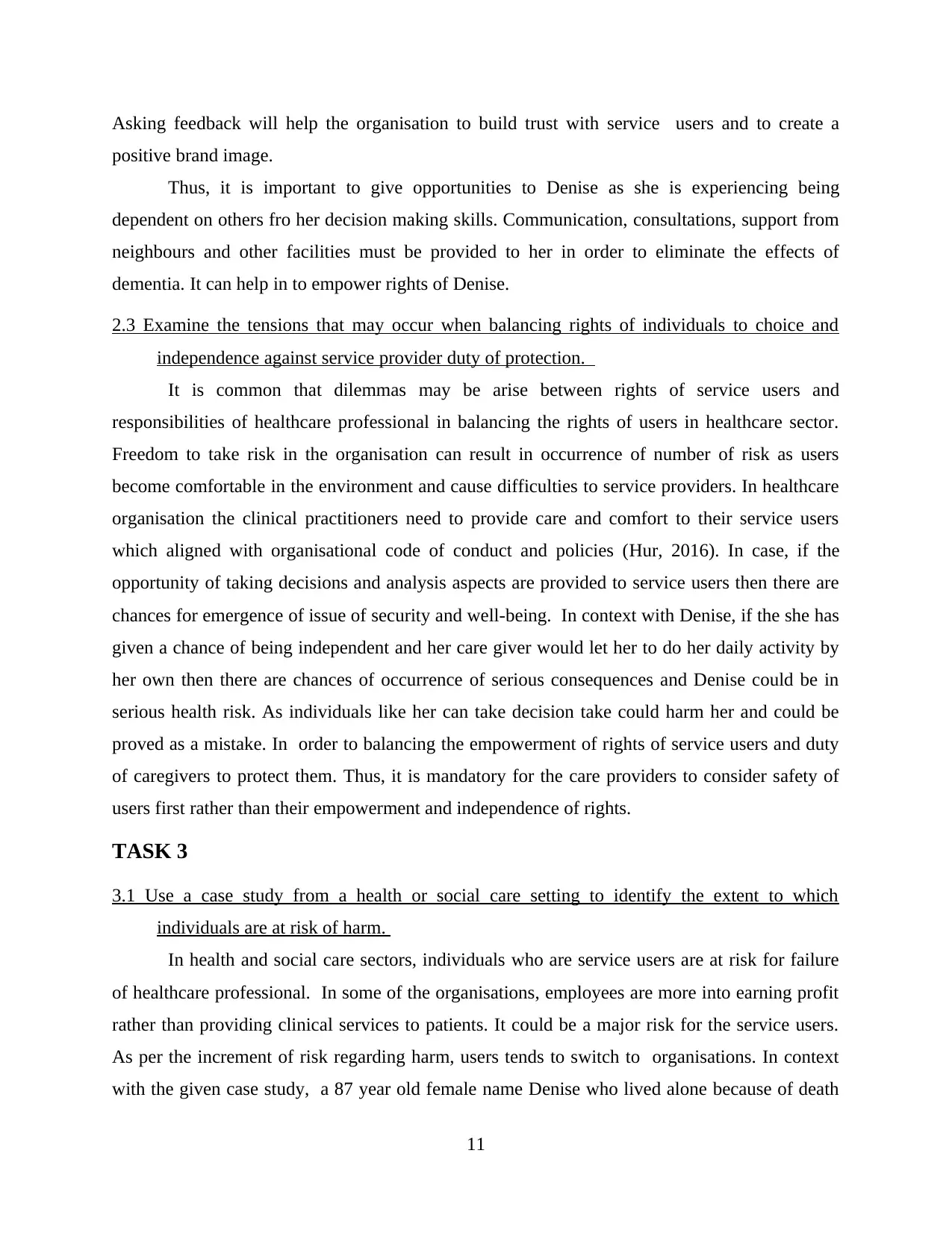
Asking feedback will help the organisation to build trust with service users and to create a
positive brand image.
Thus, it is important to give opportunities to Denise as she is experiencing being
dependent on others fro her decision making skills. Communication, consultations, support from
neighbours and other facilities must be provided to her in order to eliminate the effects of
dementia. It can help in to empower rights of Denise.
2.3 Examine the tensions that may occur when balancing rights of individuals to choice and
independence against service provider duty of protection.
It is common that dilemmas may be arise between rights of service users and
responsibilities of healthcare professional in balancing the rights of users in healthcare sector.
Freedom to take risk in the organisation can result in occurrence of number of risk as users
become comfortable in the environment and cause difficulties to service providers. In healthcare
organisation the clinical practitioners need to provide care and comfort to their service users
which aligned with organisational code of conduct and policies (Hur, 2016). In case, if the
opportunity of taking decisions and analysis aspects are provided to service users then there are
chances for emergence of issue of security and well-being. In context with Denise, if the she has
given a chance of being independent and her care giver would let her to do her daily activity by
her own then there are chances of occurrence of serious consequences and Denise could be in
serious health risk. As individuals like her can take decision take could harm her and could be
proved as a mistake. In order to balancing the empowerment of rights of service users and duty
of caregivers to protect them. Thus, it is mandatory for the care providers to consider safety of
users first rather than their empowerment and independence of rights.
TASK 3
3.1 Use a case study from a health or social care setting to identify the extent to which
individuals are at risk of harm.
In health and social care sectors, individuals who are service users are at risk for failure
of healthcare professional. In some of the organisations, employees are more into earning profit
rather than providing clinical services to patients. It could be a major risk for the service users.
As per the increment of risk regarding harm, users tends to switch to organisations. In context
with the given case study, a 87 year old female name Denise who lived alone because of death
11
positive brand image.
Thus, it is important to give opportunities to Denise as she is experiencing being
dependent on others fro her decision making skills. Communication, consultations, support from
neighbours and other facilities must be provided to her in order to eliminate the effects of
dementia. It can help in to empower rights of Denise.
2.3 Examine the tensions that may occur when balancing rights of individuals to choice and
independence against service provider duty of protection.
It is common that dilemmas may be arise between rights of service users and
responsibilities of healthcare professional in balancing the rights of users in healthcare sector.
Freedom to take risk in the organisation can result in occurrence of number of risk as users
become comfortable in the environment and cause difficulties to service providers. In healthcare
organisation the clinical practitioners need to provide care and comfort to their service users
which aligned with organisational code of conduct and policies (Hur, 2016). In case, if the
opportunity of taking decisions and analysis aspects are provided to service users then there are
chances for emergence of issue of security and well-being. In context with Denise, if the she has
given a chance of being independent and her care giver would let her to do her daily activity by
her own then there are chances of occurrence of serious consequences and Denise could be in
serious health risk. As individuals like her can take decision take could harm her and could be
proved as a mistake. In order to balancing the empowerment of rights of service users and duty
of caregivers to protect them. Thus, it is mandatory for the care providers to consider safety of
users first rather than their empowerment and independence of rights.
TASK 3
3.1 Use a case study from a health or social care setting to identify the extent to which
individuals are at risk of harm.
In health and social care sectors, individuals who are service users are at risk for failure
of healthcare professional. In some of the organisations, employees are more into earning profit
rather than providing clinical services to patients. It could be a major risk for the service users.
As per the increment of risk regarding harm, users tends to switch to organisations. In context
with the given case study, a 87 year old female name Denise who lived alone because of death
11
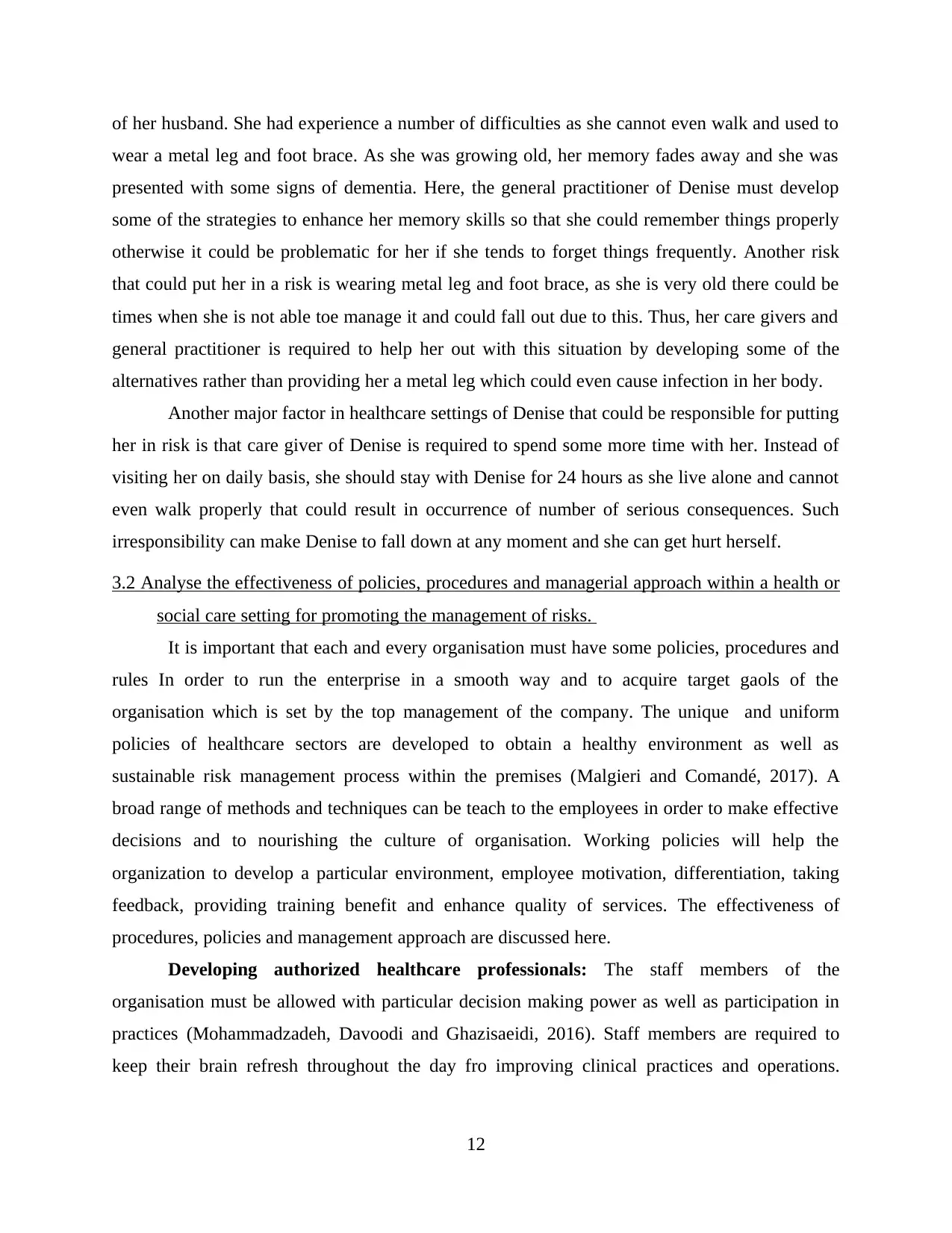
of her husband. She had experience a number of difficulties as she cannot even walk and used to
wear a metal leg and foot brace. As she was growing old, her memory fades away and she was
presented with some signs of dementia. Here, the general practitioner of Denise must develop
some of the strategies to enhance her memory skills so that she could remember things properly
otherwise it could be problematic for her if she tends to forget things frequently. Another risk
that could put her in a risk is wearing metal leg and foot brace, as she is very old there could be
times when she is not able toe manage it and could fall out due to this. Thus, her care givers and
general practitioner is required to help her out with this situation by developing some of the
alternatives rather than providing her a metal leg which could even cause infection in her body.
Another major factor in healthcare settings of Denise that could be responsible for putting
her in risk is that care giver of Denise is required to spend some more time with her. Instead of
visiting her on daily basis, she should stay with Denise for 24 hours as she live alone and cannot
even walk properly that could result in occurrence of number of serious consequences. Such
irresponsibility can make Denise to fall down at any moment and she can get hurt herself.
3.2 Analyse the effectiveness of policies, procedures and managerial approach within a health or
social care setting for promoting the management of risks.
It is important that each and every organisation must have some policies, procedures and
rules In order to run the enterprise in a smooth way and to acquire target gaols of the
organisation which is set by the top management of the company. The unique and uniform
policies of healthcare sectors are developed to obtain a healthy environment as well as
sustainable risk management process within the premises (Malgieri and Comandé, 2017). A
broad range of methods and techniques can be teach to the employees in order to make effective
decisions and to nourishing the culture of organisation. Working policies will help the
organization to develop a particular environment, employee motivation, differentiation, taking
feedback, providing training benefit and enhance quality of services. The effectiveness of
procedures, policies and management approach are discussed here.
Developing authorized healthcare professionals: The staff members of the
organisation must be allowed with particular decision making power as well as participation in
practices (Mohammadzadeh, Davoodi and Ghazisaeidi, 2016). Staff members are required to
keep their brain refresh throughout the day fro improving clinical practices and operations.
12
wear a metal leg and foot brace. As she was growing old, her memory fades away and she was
presented with some signs of dementia. Here, the general practitioner of Denise must develop
some of the strategies to enhance her memory skills so that she could remember things properly
otherwise it could be problematic for her if she tends to forget things frequently. Another risk
that could put her in a risk is wearing metal leg and foot brace, as she is very old there could be
times when she is not able toe manage it and could fall out due to this. Thus, her care givers and
general practitioner is required to help her out with this situation by developing some of the
alternatives rather than providing her a metal leg which could even cause infection in her body.
Another major factor in healthcare settings of Denise that could be responsible for putting
her in risk is that care giver of Denise is required to spend some more time with her. Instead of
visiting her on daily basis, she should stay with Denise for 24 hours as she live alone and cannot
even walk properly that could result in occurrence of number of serious consequences. Such
irresponsibility can make Denise to fall down at any moment and she can get hurt herself.
3.2 Analyse the effectiveness of policies, procedures and managerial approach within a health or
social care setting for promoting the management of risks.
It is important that each and every organisation must have some policies, procedures and
rules In order to run the enterprise in a smooth way and to acquire target gaols of the
organisation which is set by the top management of the company. The unique and uniform
policies of healthcare sectors are developed to obtain a healthy environment as well as
sustainable risk management process within the premises (Malgieri and Comandé, 2017). A
broad range of methods and techniques can be teach to the employees in order to make effective
decisions and to nourishing the culture of organisation. Working policies will help the
organization to develop a particular environment, employee motivation, differentiation, taking
feedback, providing training benefit and enhance quality of services. The effectiveness of
procedures, policies and management approach are discussed here.
Developing authorized healthcare professionals: The staff members of the
organisation must be allowed with particular decision making power as well as participation in
practices (Mohammadzadeh, Davoodi and Ghazisaeidi, 2016). Staff members are required to
keep their brain refresh throughout the day fro improving clinical practices and operations.
12
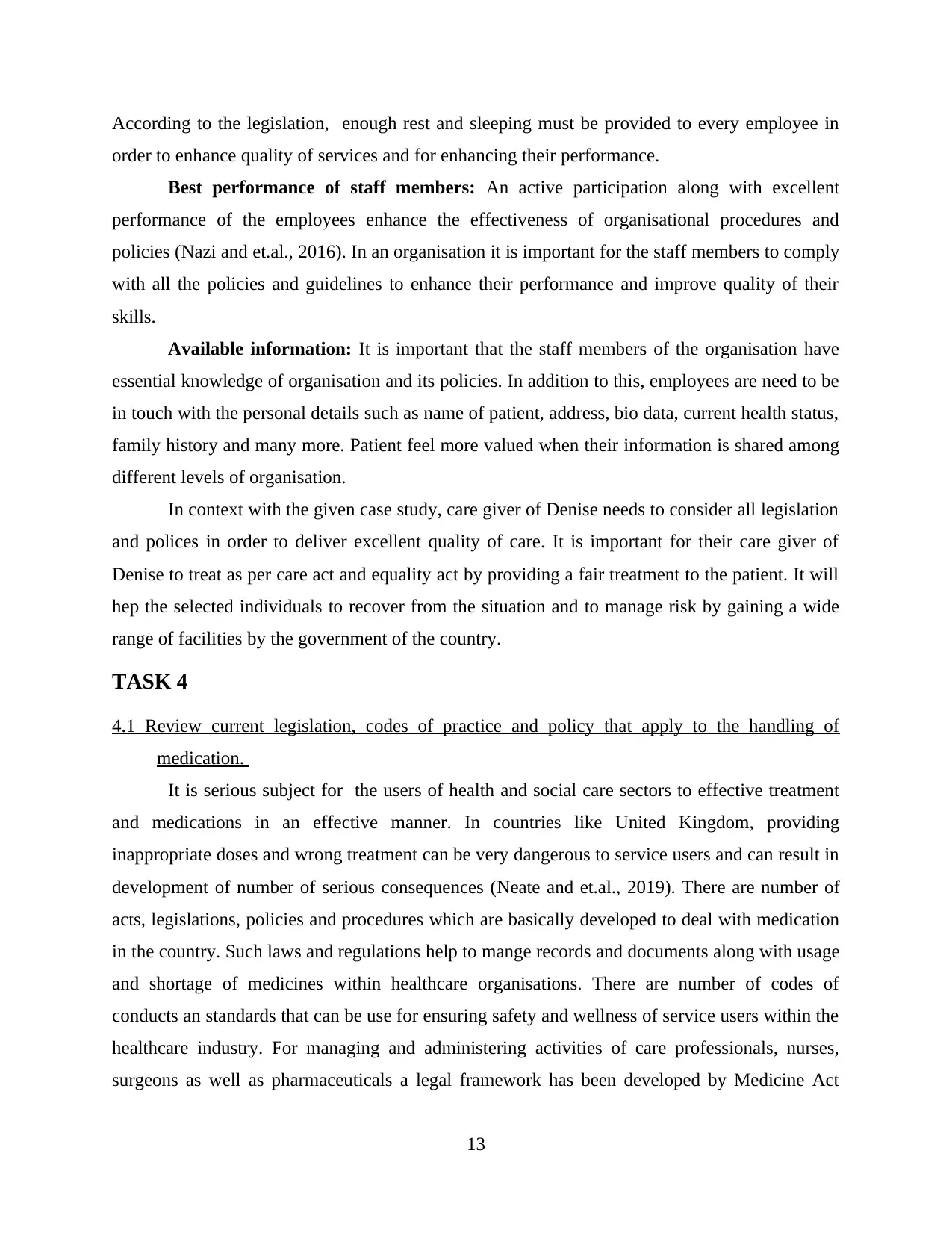
According to the legislation, enough rest and sleeping must be provided to every employee in
order to enhance quality of services and for enhancing their performance.
Best performance of staff members: An active participation along with excellent
performance of the employees enhance the effectiveness of organisational procedures and
policies (Nazi and et.al., 2016). In an organisation it is important for the staff members to comply
with all the policies and guidelines to enhance their performance and improve quality of their
skills.
Available information: It is important that the staff members of the organisation have
essential knowledge of organisation and its policies. In addition to this, employees are need to be
in touch with the personal details such as name of patient, address, bio data, current health status,
family history and many more. Patient feel more valued when their information is shared among
different levels of organisation.
In context with the given case study, care giver of Denise needs to consider all legislation
and polices in order to deliver excellent quality of care. It is important for their care giver of
Denise to treat as per care act and equality act by providing a fair treatment to the patient. It will
hep the selected individuals to recover from the situation and to manage risk by gaining a wide
range of facilities by the government of the country.
TASK 4
4.1 Review current legislation, codes of practice and policy that apply to the handling of
medication.
It is serious subject for the users of health and social care sectors to effective treatment
and medications in an effective manner. In countries like United Kingdom, providing
inappropriate doses and wrong treatment can be very dangerous to service users and can result in
development of number of serious consequences (Neate and et.al., 2019). There are number of
acts, legislations, policies and procedures which are basically developed to deal with medication
in the country. Such laws and regulations help to mange records and documents along with usage
and shortage of medicines within healthcare organisations. There are number of codes of
conducts an standards that can be use for ensuring safety and wellness of service users within the
healthcare industry. For managing and administering activities of care professionals, nurses,
surgeons as well as pharmaceuticals a legal framework has been developed by Medicine Act
13
order to enhance quality of services and for enhancing their performance.
Best performance of staff members: An active participation along with excellent
performance of the employees enhance the effectiveness of organisational procedures and
policies (Nazi and et.al., 2016). In an organisation it is important for the staff members to comply
with all the policies and guidelines to enhance their performance and improve quality of their
skills.
Available information: It is important that the staff members of the organisation have
essential knowledge of organisation and its policies. In addition to this, employees are need to be
in touch with the personal details such as name of patient, address, bio data, current health status,
family history and many more. Patient feel more valued when their information is shared among
different levels of organisation.
In context with the given case study, care giver of Denise needs to consider all legislation
and polices in order to deliver excellent quality of care. It is important for their care giver of
Denise to treat as per care act and equality act by providing a fair treatment to the patient. It will
hep the selected individuals to recover from the situation and to manage risk by gaining a wide
range of facilities by the government of the country.
TASK 4
4.1 Review current legislation, codes of practice and policy that apply to the handling of
medication.
It is serious subject for the users of health and social care sectors to effective treatment
and medications in an effective manner. In countries like United Kingdom, providing
inappropriate doses and wrong treatment can be very dangerous to service users and can result in
development of number of serious consequences (Neate and et.al., 2019). There are number of
acts, legislations, policies and procedures which are basically developed to deal with medication
in the country. Such laws and regulations help to mange records and documents along with usage
and shortage of medicines within healthcare organisations. There are number of codes of
conducts an standards that can be use for ensuring safety and wellness of service users within the
healthcare industry. For managing and administering activities of care professionals, nurses,
surgeons as well as pharmaceuticals a legal framework has been developed by Medicine Act
13
Paraphrase This Document
Need a fresh take? Get an instant paraphrase of this document with our AI Paraphraser
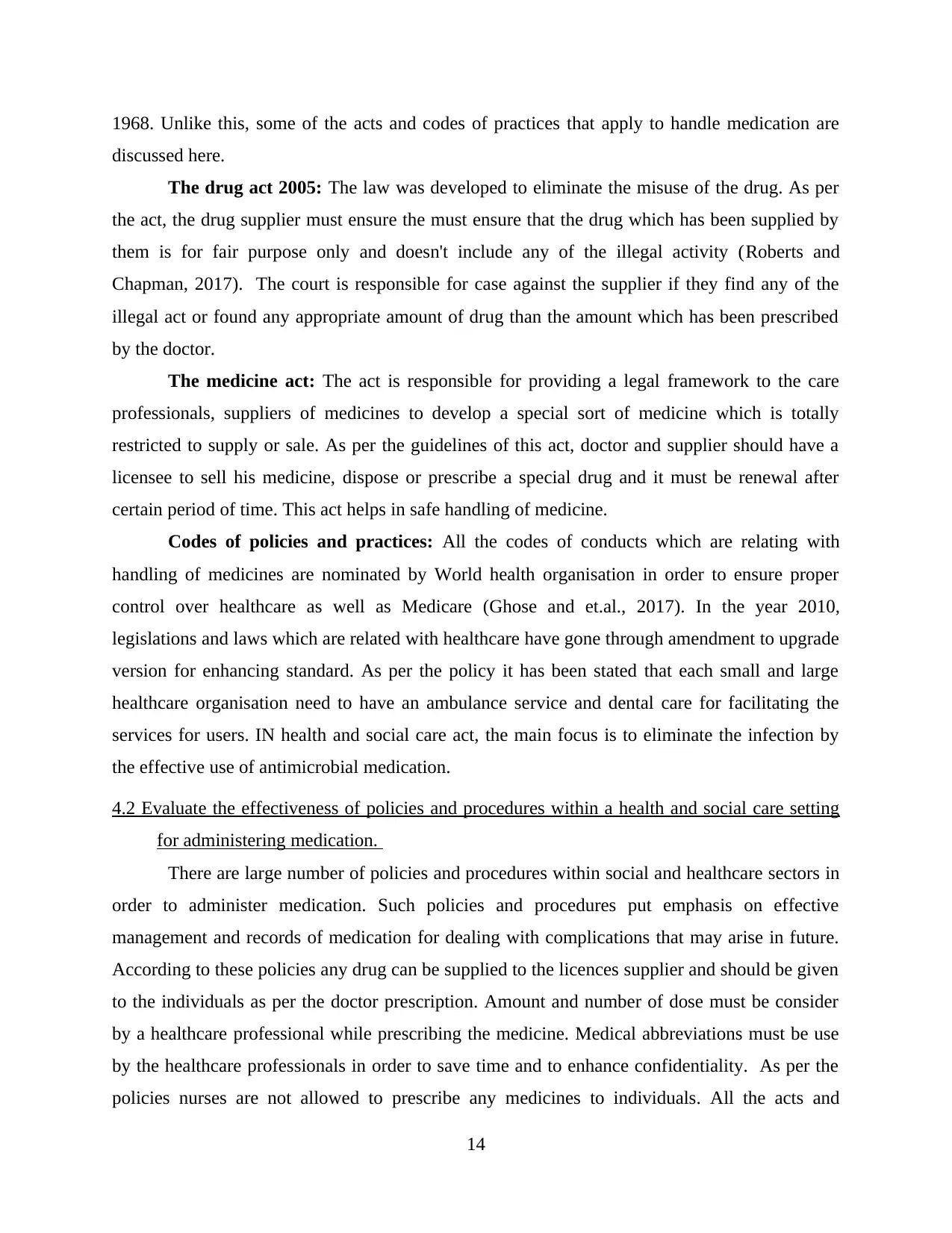
1968. Unlike this, some of the acts and codes of practices that apply to handle medication are
discussed here.
The drug act 2005: The law was developed to eliminate the misuse of the drug. As per
the act, the drug supplier must ensure the must ensure that the drug which has been supplied by
them is for fair purpose only and doesn't include any of the illegal activity (Roberts and
Chapman, 2017). The court is responsible for case against the supplier if they find any of the
illegal act or found any appropriate amount of drug than the amount which has been prescribed
by the doctor.
The medicine act: The act is responsible for providing a legal framework to the care
professionals, suppliers of medicines to develop a special sort of medicine which is totally
restricted to supply or sale. As per the guidelines of this act, doctor and supplier should have a
licensee to sell his medicine, dispose or prescribe a special drug and it must be renewal after
certain period of time. This act helps in safe handling of medicine.
Codes of policies and practices: All the codes of conducts which are relating with
handling of medicines are nominated by World health organisation in order to ensure proper
control over healthcare as well as Medicare (Ghose and et.al., 2017). In the year 2010,
legislations and laws which are related with healthcare have gone through amendment to upgrade
version for enhancing standard. As per the policy it has been stated that each small and large
healthcare organisation need to have an ambulance service and dental care for facilitating the
services for users. IN health and social care act, the main focus is to eliminate the infection by
the effective use of antimicrobial medication.
4.2 Evaluate the effectiveness of policies and procedures within a health and social care setting
for administering medication.
There are large number of policies and procedures within social and healthcare sectors in
order to administer medication. Such policies and procedures put emphasis on effective
management and records of medication for dealing with complications that may arise in future.
According to these policies any drug can be supplied to the licences supplier and should be given
to the individuals as per the doctor prescription. Amount and number of dose must be consider
by a healthcare professional while prescribing the medicine. Medical abbreviations must be use
by the healthcare professionals in order to save time and to enhance confidentiality. As per the
policies nurses are not allowed to prescribe any medicines to individuals. All the acts and
14
discussed here.
The drug act 2005: The law was developed to eliminate the misuse of the drug. As per
the act, the drug supplier must ensure the must ensure that the drug which has been supplied by
them is for fair purpose only and doesn't include any of the illegal activity (Roberts and
Chapman, 2017). The court is responsible for case against the supplier if they find any of the
illegal act or found any appropriate amount of drug than the amount which has been prescribed
by the doctor.
The medicine act: The act is responsible for providing a legal framework to the care
professionals, suppliers of medicines to develop a special sort of medicine which is totally
restricted to supply or sale. As per the guidelines of this act, doctor and supplier should have a
licensee to sell his medicine, dispose or prescribe a special drug and it must be renewal after
certain period of time. This act helps in safe handling of medicine.
Codes of policies and practices: All the codes of conducts which are relating with
handling of medicines are nominated by World health organisation in order to ensure proper
control over healthcare as well as Medicare (Ghose and et.al., 2017). In the year 2010,
legislations and laws which are related with healthcare have gone through amendment to upgrade
version for enhancing standard. As per the policy it has been stated that each small and large
healthcare organisation need to have an ambulance service and dental care for facilitating the
services for users. IN health and social care act, the main focus is to eliminate the infection by
the effective use of antimicrobial medication.
4.2 Evaluate the effectiveness of policies and procedures within a health and social care setting
for administering medication.
There are large number of policies and procedures within social and healthcare sectors in
order to administer medication. Such policies and procedures put emphasis on effective
management and records of medication for dealing with complications that may arise in future.
According to these policies any drug can be supplied to the licences supplier and should be given
to the individuals as per the doctor prescription. Amount and number of dose must be consider
by a healthcare professional while prescribing the medicine. Medical abbreviations must be use
by the healthcare professionals in order to save time and to enhance confidentiality. As per the
policies nurses are not allowed to prescribe any medicines to individuals. All the acts and
14
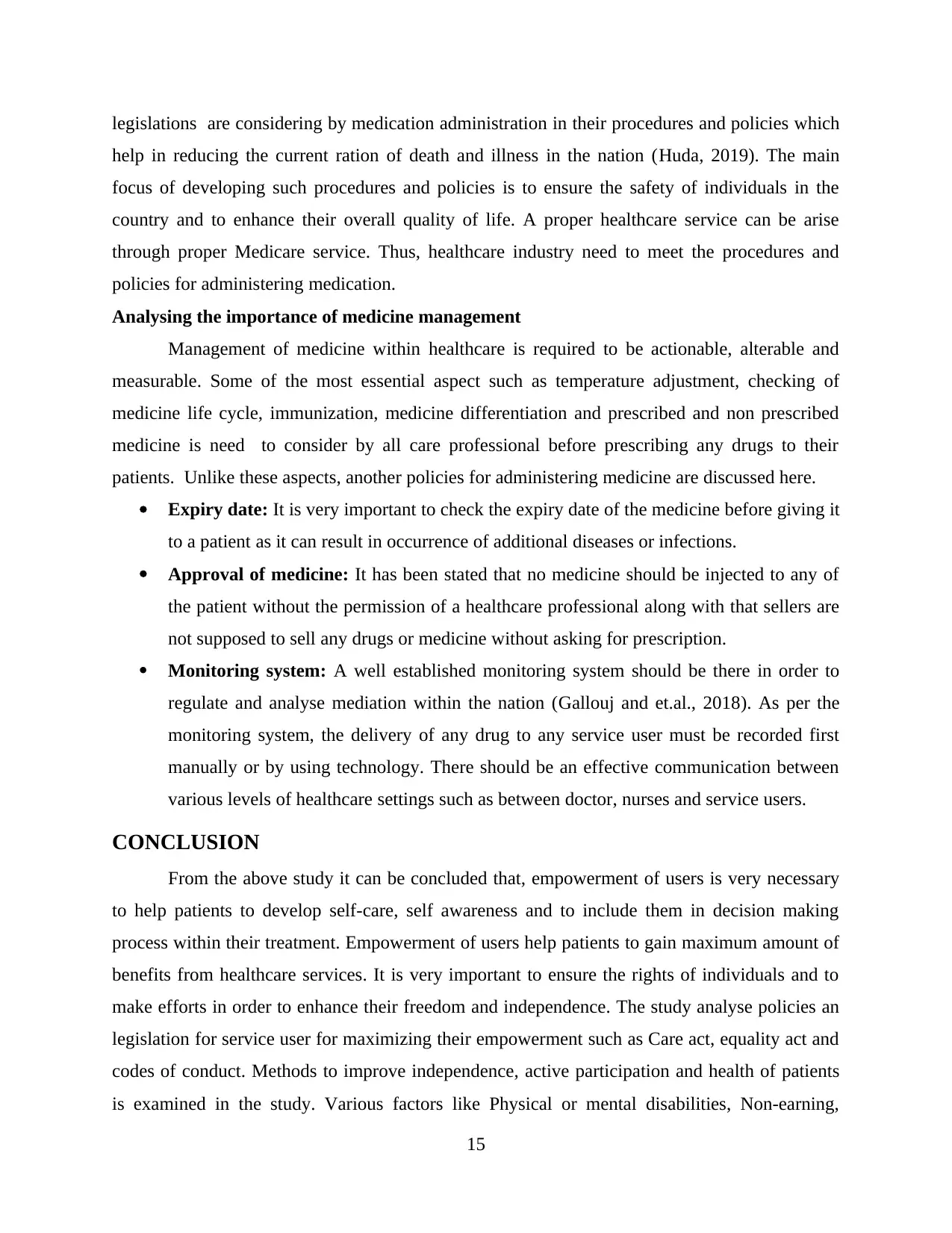
legislations are considering by medication administration in their procedures and policies which
help in reducing the current ration of death and illness in the nation (Huda, 2019). The main
focus of developing such procedures and policies is to ensure the safety of individuals in the
country and to enhance their overall quality of life. A proper healthcare service can be arise
through proper Medicare service. Thus, healthcare industry need to meet the procedures and
policies for administering medication.
Analysing the importance of medicine management
Management of medicine within healthcare is required to be actionable, alterable and
measurable. Some of the most essential aspect such as temperature adjustment, checking of
medicine life cycle, immunization, medicine differentiation and prescribed and non prescribed
medicine is need to consider by all care professional before prescribing any drugs to their
patients. Unlike these aspects, another policies for administering medicine are discussed here.
Expiry date: It is very important to check the expiry date of the medicine before giving it
to a patient as it can result in occurrence of additional diseases or infections.
Approval of medicine: It has been stated that no medicine should be injected to any of
the patient without the permission of a healthcare professional along with that sellers are
not supposed to sell any drugs or medicine without asking for prescription.
Monitoring system: A well established monitoring system should be there in order to
regulate and analyse mediation within the nation (Gallouj and et.al., 2018). As per the
monitoring system, the delivery of any drug to any service user must be recorded first
manually or by using technology. There should be an effective communication between
various levels of healthcare settings such as between doctor, nurses and service users.
CONCLUSION
From the above study it can be concluded that, empowerment of users is very necessary
to help patients to develop self-care, self awareness and to include them in decision making
process within their treatment. Empowerment of users help patients to gain maximum amount of
benefits from healthcare services. It is very important to ensure the rights of individuals and to
make efforts in order to enhance their freedom and independence. The study analyse policies an
legislation for service user for maximizing their empowerment such as Care act, equality act and
codes of conduct. Methods to improve independence, active participation and health of patients
is examined in the study. Various factors like Physical or mental disabilities, Non-earning,
15
help in reducing the current ration of death and illness in the nation (Huda, 2019). The main
focus of developing such procedures and policies is to ensure the safety of individuals in the
country and to enhance their overall quality of life. A proper healthcare service can be arise
through proper Medicare service. Thus, healthcare industry need to meet the procedures and
policies for administering medication.
Analysing the importance of medicine management
Management of medicine within healthcare is required to be actionable, alterable and
measurable. Some of the most essential aspect such as temperature adjustment, checking of
medicine life cycle, immunization, medicine differentiation and prescribed and non prescribed
medicine is need to consider by all care professional before prescribing any drugs to their
patients. Unlike these aspects, another policies for administering medicine are discussed here.
Expiry date: It is very important to check the expiry date of the medicine before giving it
to a patient as it can result in occurrence of additional diseases or infections.
Approval of medicine: It has been stated that no medicine should be injected to any of
the patient without the permission of a healthcare professional along with that sellers are
not supposed to sell any drugs or medicine without asking for prescription.
Monitoring system: A well established monitoring system should be there in order to
regulate and analyse mediation within the nation (Gallouj and et.al., 2018). As per the
monitoring system, the delivery of any drug to any service user must be recorded first
manually or by using technology. There should be an effective communication between
various levels of healthcare settings such as between doctor, nurses and service users.
CONCLUSION
From the above study it can be concluded that, empowerment of users is very necessary
to help patients to develop self-care, self awareness and to include them in decision making
process within their treatment. Empowerment of users help patients to gain maximum amount of
benefits from healthcare services. It is very important to ensure the rights of individuals and to
make efforts in order to enhance their freedom and independence. The study analyse policies an
legislation for service user for maximizing their empowerment such as Care act, equality act and
codes of conduct. Methods to improve independence, active participation and health of patients
is examined in the study. Various factors like Physical or mental disabilities, Non-earning,
15
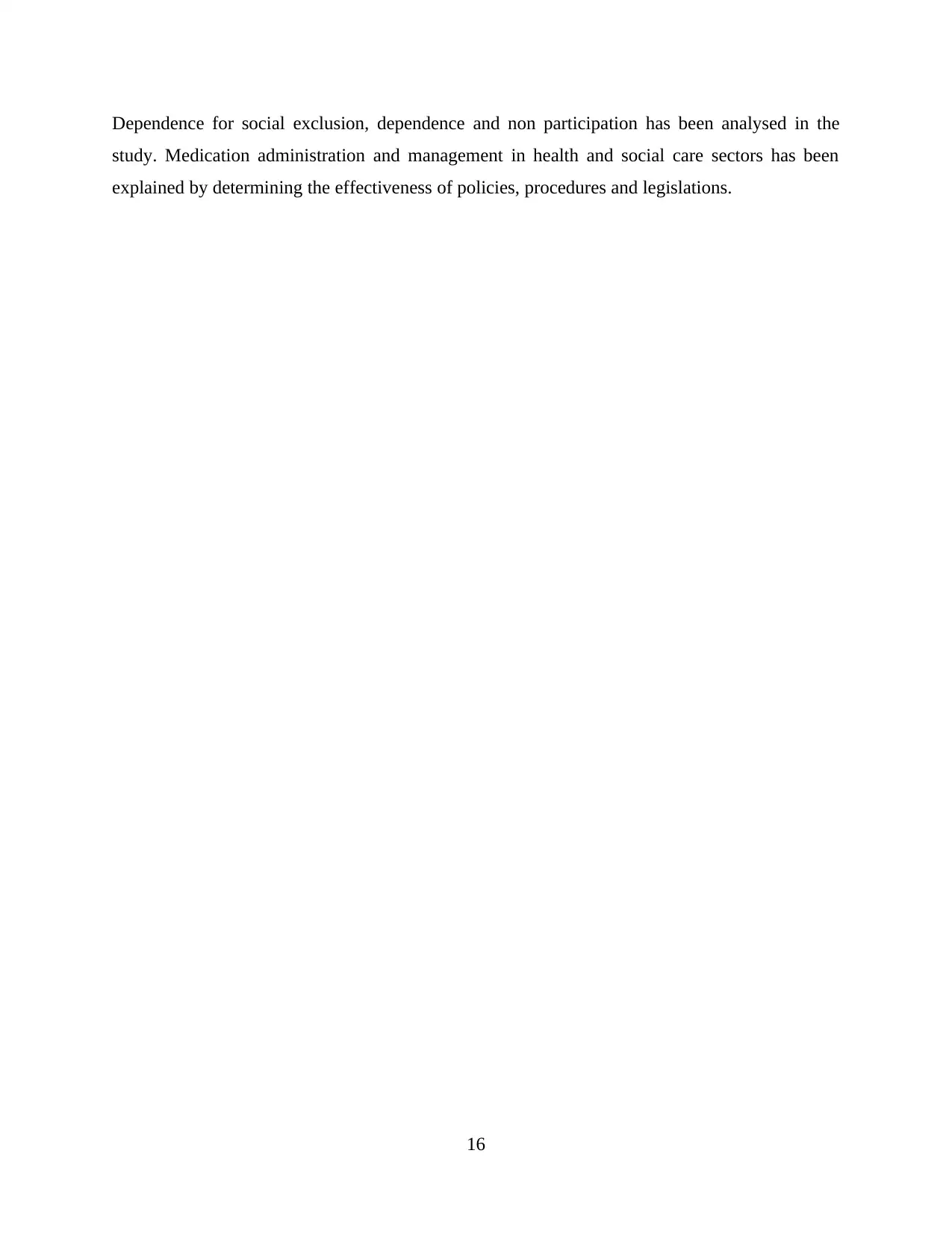
Dependence for social exclusion, dependence and non participation has been analysed in the
study. Medication administration and management in health and social care sectors has been
explained by determining the effectiveness of policies, procedures and legislations.
16
study. Medication administration and management in health and social care sectors has been
explained by determining the effectiveness of policies, procedures and legislations.
16
Secure Best Marks with AI Grader
Need help grading? Try our AI Grader for instant feedback on your assignments.
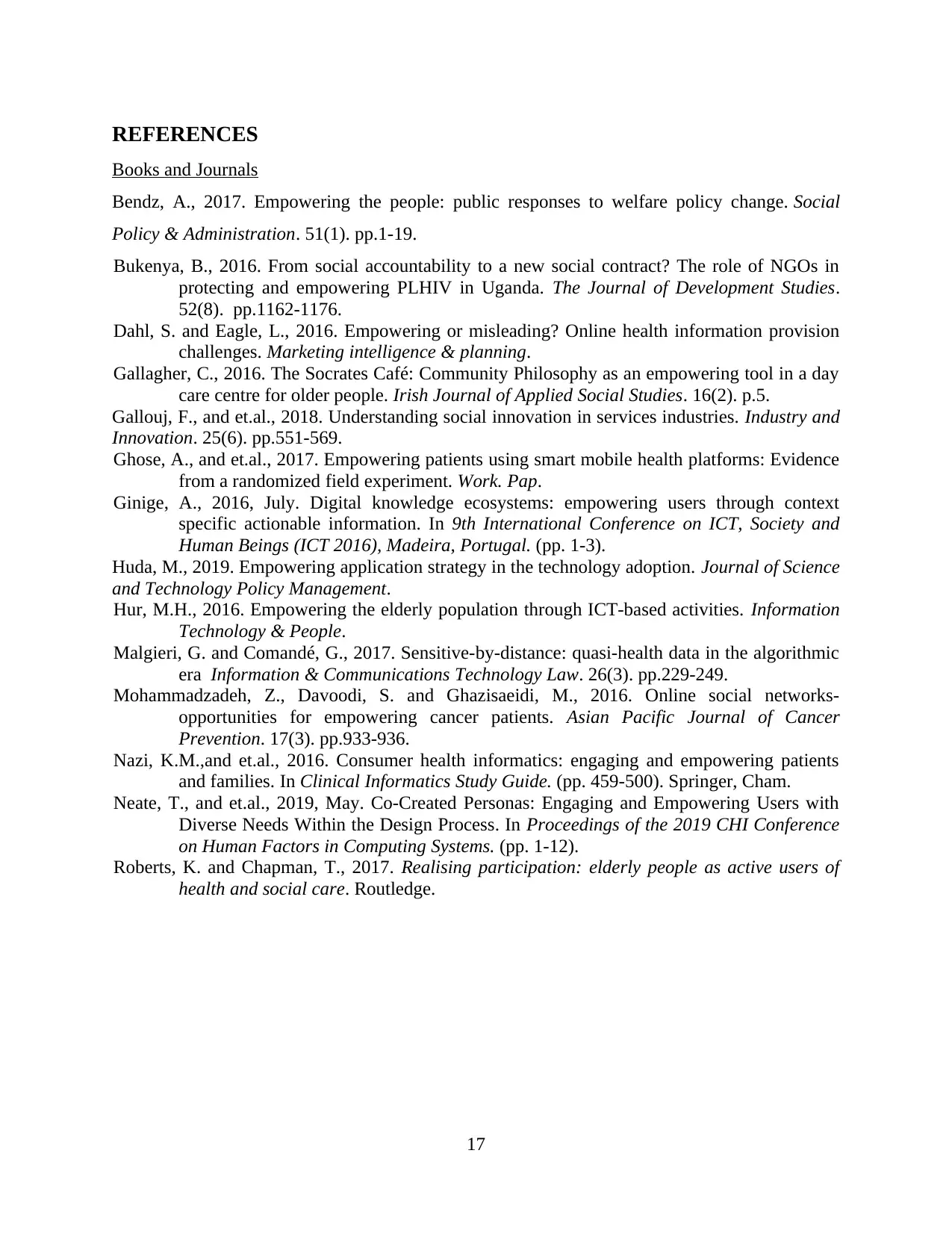
REFERENCES
Books and Journals
Bendz, A., 2017. Empowering the people: public responses to welfare policy change. Social
Policy & Administration. 51(1). pp.1-19.
Bukenya, B., 2016. From social accountability to a new social contract? The role of NGOs in
protecting and empowering PLHIV in Uganda. The Journal of Development Studies.
52(8). pp.1162-1176.
Dahl, S. and Eagle, L., 2016. Empowering or misleading? Online health information provision
challenges. Marketing intelligence & planning.
Gallagher, C., 2016. The Socrates Café: Community Philosophy as an empowering tool in a day
care centre for older people. Irish Journal of Applied Social Studies. 16(2). p.5.
Gallouj, F., and et.al., 2018. Understanding social innovation in services industries. Industry and
Innovation. 25(6). pp.551-569.
Ghose, A., and et.al., 2017. Empowering patients using smart mobile health platforms: Evidence
from a randomized field experiment. Work. Pap.
Ginige, A., 2016, July. Digital knowledge ecosystems: empowering users through context
specific actionable information. In 9th International Conference on ICT, Society and
Human Beings (ICT 2016), Madeira, Portugal. (pp. 1-3).
Huda, M., 2019. Empowering application strategy in the technology adoption. Journal of Science
and Technology Policy Management.
Hur, M.H., 2016. Empowering the elderly population through ICT-based activities. Information
Technology & People.
Malgieri, G. and Comandé, G., 2017. Sensitive-by-distance: quasi-health data in the algorithmic
era Information & Communications Technology Law. 26(3). pp.229-249.
Mohammadzadeh, Z., Davoodi, S. and Ghazisaeidi, M., 2016. Online social networks-
opportunities for empowering cancer patients. Asian Pacific Journal of Cancer
Prevention. 17(3). pp.933-936.
Nazi, K.M.,and et.al., 2016. Consumer health informatics: engaging and empowering patients
and families. In Clinical Informatics Study Guide. (pp. 459-500). Springer, Cham.
Neate, T., and et.al., 2019, May. Co-Created Personas: Engaging and Empowering Users with
Diverse Needs Within the Design Process. In Proceedings of the 2019 CHI Conference
on Human Factors in Computing Systems. (pp. 1-12).
Roberts, K. and Chapman, T., 2017. Realising participation: elderly people as active users of
health and social care. Routledge.
17
Books and Journals
Bendz, A., 2017. Empowering the people: public responses to welfare policy change. Social
Policy & Administration. 51(1). pp.1-19.
Bukenya, B., 2016. From social accountability to a new social contract? The role of NGOs in
protecting and empowering PLHIV in Uganda. The Journal of Development Studies.
52(8). pp.1162-1176.
Dahl, S. and Eagle, L., 2016. Empowering or misleading? Online health information provision
challenges. Marketing intelligence & planning.
Gallagher, C., 2016. The Socrates Café: Community Philosophy as an empowering tool in a day
care centre for older people. Irish Journal of Applied Social Studies. 16(2). p.5.
Gallouj, F., and et.al., 2018. Understanding social innovation in services industries. Industry and
Innovation. 25(6). pp.551-569.
Ghose, A., and et.al., 2017. Empowering patients using smart mobile health platforms: Evidence
from a randomized field experiment. Work. Pap.
Ginige, A., 2016, July. Digital knowledge ecosystems: empowering users through context
specific actionable information. In 9th International Conference on ICT, Society and
Human Beings (ICT 2016), Madeira, Portugal. (pp. 1-3).
Huda, M., 2019. Empowering application strategy in the technology adoption. Journal of Science
and Technology Policy Management.
Hur, M.H., 2016. Empowering the elderly population through ICT-based activities. Information
Technology & People.
Malgieri, G. and Comandé, G., 2017. Sensitive-by-distance: quasi-health data in the algorithmic
era Information & Communications Technology Law. 26(3). pp.229-249.
Mohammadzadeh, Z., Davoodi, S. and Ghazisaeidi, M., 2016. Online social networks-
opportunities for empowering cancer patients. Asian Pacific Journal of Cancer
Prevention. 17(3). pp.933-936.
Nazi, K.M.,and et.al., 2016. Consumer health informatics: engaging and empowering patients
and families. In Clinical Informatics Study Guide. (pp. 459-500). Springer, Cham.
Neate, T., and et.al., 2019, May. Co-Created Personas: Engaging and Empowering Users with
Diverse Needs Within the Design Process. In Proceedings of the 2019 CHI Conference
on Human Factors in Computing Systems. (pp. 1-12).
Roberts, K. and Chapman, T., 2017. Realising participation: elderly people as active users of
health and social care. Routledge.
17
1 out of 17
Related Documents
Your All-in-One AI-Powered Toolkit for Academic Success.
+13062052269
info@desklib.com
Available 24*7 on WhatsApp / Email
![[object Object]](/_next/static/media/star-bottom.7253800d.svg)
Unlock your academic potential
© 2024 | Zucol Services PVT LTD | All rights reserved.





